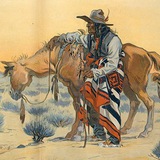"The forest passage has a closer relationship to freedom than any armaments can; a native will to resistance lives in it. Thus it is fit only for volunteers, who will defend themselves under all circumstances, whether a state trains, arms, and calls on them or not. In this manner they demonstrate —existentially—their freedom. Freedom is today’s great theme; it is this force that will conquer fear."
— Ernst Jünger, The Forest Passage, 1951.
— Ernst Jünger, The Forest Passage, 1951.
❤3
"I love the forest. It is bad to live in cities: there, there are too many of the lustful...
And just look at these men: their eye saith it — they know nothing better on earth than to lie with a woman.
Filth is at the bottom of their souls; and alas! if their filth hath still spirit in it!
Would that ye were perfect — at least as animals! But to animals belongeth innocence."
— Thus Spoke Zarathustra, F. Nietzsche
And just look at these men: their eye saith it — they know nothing better on earth than to lie with a woman.
Filth is at the bottom of their souls; and alas! if their filth hath still spirit in it!
Would that ye were perfect — at least as animals! But to animals belongeth innocence."
— Thus Spoke Zarathustra, F. Nietzsche
❤4
Forwarded from White Apologia
“The Germany of the future can only be a peasant kingdom [Bauernreich] or it will fall again, as the kingdoms of the Hohenstaufen and the Hohenzollern fell, because they forgot to seek their Völkischen and economic focus within themselves. Every blow of fate, every crisis can be overcome if a healthy and vigorous peasantry forms the living basis of the Volkes!
Völker ['peoples'] who have sacrificed their peasantry to anti-völkisch financial greed have always disappeared from history. [...] The peasant contrasts the urban practice of few or no children with the wealth of a marriage full of children.”
— On September 29, 1933, R. W. Darré contributed to völkisch thinking, highlighting Erbhof's concept.
The “urban energy” or urban lifestyle is a threat to the Nordic race.
❤2🔥2
